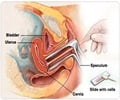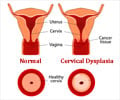Out of the 3,121 new cases diagnosed each year, 20% were in women aged 65 and over. Women over this age also accounted for half of deaths from cervical cancer.

Three in five women in this age group did not know that almost all cases of cervical cancer are caused by the sexually transmitted human papillomavirus (HPV). Many failed to see historic sexual activity as a threat with the virus laying dormant and developing into cervical cancer later in life.
Screening is the most effective way of preventing cervical cancer and is offered to women aged from 25 to 64 on the NHS, yet figures show that last year there was a significant drop as women’s age increased.
Sue Sherman, Senior lecturer in psychology at Keele University, said, "This review suggests that older women not getting themselves screened to prevent cervical cancer has become a significant contributor to the number contracting the disease."
"Encouragingly we found that women with three negative tests for cervical cancer between 50 and 64 are considerably less likely to get the disease in the next 20 years. So regular screenings have the potential to catch the disease early and reduce the victims of cervical cancer dramatically," he added.
Robert Music, chief executive of Jo’s Cervical Cancer Trust, said, "It’s absolutely vital that women of all ages are educated around the cause of cervical cancer and their risk of HPV. Responses from women questioned in our research were worrying with some citing they had been 'celibate’ for several years and therefore did not consider themselves to be at risk."
 MEDINDIA
MEDINDIA




 Email
Email










